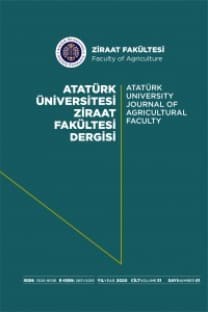ERZURUM PİYASASINDA SATILMAKTA OLAN SEBZE KONSERVELERİ ÜZERİNDE MİKROBİYOLOJİK ARAŞTIRMALAR
ÖZETYurdumuzun birçok yerlerinde olduğu gibi, Erzurum çevresinde deher geç~n yıl konservecilik gelişmekte l'e konserve ürünler artmaktadır.Bölgemizde, köylüleı imizin bir araya gelerek kurmuş oldukları kooperatifleraracılığı ile işlettikleri konserve imalathanelerinin; daha verimliçalışması, üretilen konservelerin daha dayanıklı olması, konserl'e gıdalardanmaksimum faydanın sağlanabilmesi ve halk sağlığı açısından,meydana gelebilecek zararların önlenmesi amacıyla, bu imalathanelerdeüretilen sebze konservelerinin mikrobiyolojik kontrollerinin yapılması,araştırmamızın esas gayesini teşkil etmektedir. Ayrıca, yine halkımızınsağlrğı yönünden ve bölgemizde üretilen konservelerin üzerinde yapılançalışmaları mukayese etmek için, Erzurum ili dışında üretilip şehir piyasasındasatılmakta olan teneke kutulardaki çeşitli sebze konserveleri deaynı mikrobiyolojik incelemelere tabi tutuldu.Bu çalışmada, Erzurum çevresinde yapılan yeşilfasulye konser-l'ele~rinden 125 adet, Erzurum ili dışında üretilen çeşitli sebze konseivelerinden128 adet olmak üzere toplam 253 adet konserve örneği kullanıldı.Örneklerin kültürel muayenelerinde, Erzurum kaynaklı kOflservelerin63 ünden CI';; 50.4) 76, Erzurum ili dışında yapılan konservelerin II indenCI';; 8.6) II olmak üzere toplam 87 Bacillus stamı Cstrain) izoleedildi. /dentifikasyon işlemleri sonunda, Erzurum çel'resinde üretilenkonserve örneklerinin 41 inde (% 32.8) Bacillus stearothermophilus,9 unda CI';; 7.2) B. subtilis, 13 ünde (% 10.0) B. pumilus, 6 sında CI';; 4.8)B. megaterium, 2 sinde Cl';; 1.6) B. cereus, Erzurum ili dışında yapılankonservelerden, bezeiyelerin 1 inde C% 1.5) B. stearothermophilus, 4 ünde (% 5.9) B. subtilis, i inde (% 1.5) B. pumi/us, türlülerin 3 üde(% 10.0) Ye baklaların 1 inde (% i 0.0) B: subtilis bakteri türlerininbulunduğu saptandı. Böylece, izole edi/en 87 Bacillus cınsı bakteristamlarından 82 sinin (% 94.3) tanımı yapılabi/di. Beşi (% 5.7) ise tanımlanamadı.MICROBIOLOGICAL RESEARCHES ON THE CANNEDVEGETABLE FOODS SOLD IN ERZURUMin this research, 253 samples ofcanned vegetable, inCıuding 125 samplesof canned green beans coilectedfrom the Erzurum Province and 128samples of various canned vegetableproduced in the other places apartfrom Erzurum Province, were mierobiologicallyexamined.At the cultural examinations 87Baci/lus strains were isolated. Seveutysixof these were isolated from 63samp1es of Erzurum origine and theother II strains were from out of Erzurumorigine. At the and of the roierobiologicalidentification, the followingfindings were obtained; a) fortyone(32.8 %) out of 125 samples ofvegetable collected from Erzuıum Provincewith Badl/us stearothermophilus,9 samples (7. %) with B. subti/is, 13. samples (4.8 %) with B. megateriumand 2 samples 0.6 %) were cantamiuatedwith B. cereus. b) in the caseof the samples produced. out side ofErzurum Province, one of the cannedpea samples (1.5 %) with B. stearot~hermophilus, and 4 (5.9 %) sampleswith B. subtilis and one sample (I.5~) was contaminated with E. pumi/us.Three samples of the mixed vegetablosamples (10.0 %) and one of the br0ad-bean samples (10.0 %) were contaminatedwith B. subtilis. Thus, themicrobiological identification of the82 (94.3 %) of 87 Bacillus strains couldbe made, whereas 5 (5.7 %) Bacillusstrains could not be identified.In addit on, the results found inthis work discussed and comparedwith the findings of previous workswhich have been given in the literaturereview. As a result, in order to producehealtier canned foods, sonie generalsugges60ns were ~iven.
